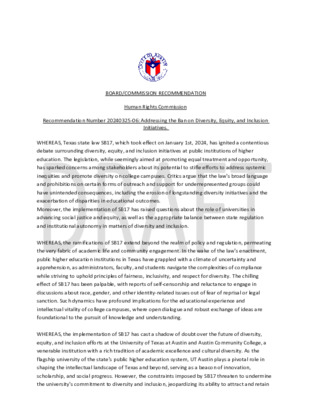Backup — original pdf
Backup

BOARD/COMMISSION RECOMMENDATION Human Rights Commission Recommendation Number 20240325-06: Addressing the Ban on Diversity, Equity, and Inclusion Initiatives. WHEREAS, Texas state law SB17, which took effect on January 1st, 2024, has ignited a contentious debate surrounding diversity, equity, and inclusion initiatives at public institutions of higher education. The legislation, while seemingly aimed at promoting equal treatment and opportunity, has sparked concerns among stakeholders about its potential to stifle efforts to address systemic inequities and promote diversity on college campuses. Critics argue that the law's broad language and prohibitions on certain forms of outreach and support for underrepresented groups could have unintended consequences, including the erosion of longstanding diversity initiatives and the exacerbation of disparities in educational outcomes. Moreover, the implementation of SB17 has raised questions about the role of universities in advancing social justice and equity, as well as the appropriate balance between state regulation and institutional autonomy in matters of diversity and inclusion. WHEREAS, the ramifications of SB17 extend beyond the realm of policy and regulation, permeating the very fabric of academic life and community engagement. In the wake of the law's enactment, public higher education institutions in Texas have grappled with a climate of uncertainty and apprehension, as administrators, faculty, and students navigate the complexities of compliance while striving to uphold principles of fairness, inclusivity, and respect for diversity. The chilling effect of SB17 has been palpable, with reports of self-censorship and reluctance to engage in discussions about race, gender, and other identity-related issues out of fear of reprisal or legal sanction. Such dynamics have profound implications for the educational experience and intellectual vitality of college campuses, where open dialogue and robust exchange of ideas are foundational to the pursuit of knowledge and understanding. WHEREAS, the implementation of SB17 has cast a shadow of doubt over the future of diversity, equity, and inclusion efforts at the University of Texas at Austin and Austin Community College, a venerable institution with a rich tradition of academic excellence and cultural diversity. As the flagship university of the state's public higher education system, UT Austin plays a pivotal role in shaping the intellectual landscape of Texas and beyond, serving as a beacon of innovation, scholarship, and social progress. However, the constraints imposed by SB17 threaten to undermine the university's commitment to diversity and inclusion, jeopardizing its ability to attract and retain a diverse student body, faculty, and staff. Moreover, the chilling effect of the law has created a sense of unease among marginalized student groups, who fear that their voices may be silenced or marginalized in the face of legislative mandates that prioritize neutrality over equity. BE IT FURTHER RESOLVED, that the Austin City Council is called for the significant impact of funding and budgeting on the ability of public higher education institutions to uphold their commitments to diversity, equity, and inclusion in the face of legislative challenges such as SB17. BE IT FURTHER RESOLVED, that the Human Rights Commission calls on the Austin City Council to recognize the importance of allocating resources to support initiatives that promote diversity, equity, and inclusion, including but not limited to scholarship programs, cultural competency training, mentorship opportunities, and campus affinity groups. BE IT FURTHER RESOLVED, Commission calls on Council to commit to advocating for adequate state funding and budget allocations to ensure that universities and community colleges have the necessary resources to fulfill their mission of providing a supportive and inclusive learning environment for all students, regardless of race, gender, or background. BE IT FURTHER RESOLVED that the Austin City Council, in collaboration with the Human Rights Commission, is recommended to instruct its Equity office to engage with various students’ organizations to provide moral and material support to alleviate the effects of the new law on the well-being of minority student groups. BE IT FURTHER RESOLVED, that the Human Rights Commission calls on the Austin City Council to acknowledge the urgency of addressing the needs of its college student’s population suffering from state laws reversing years of progress and equal opportunities for students of color and gender minorities. Date of Approval: _ Record of the vote: Attest: